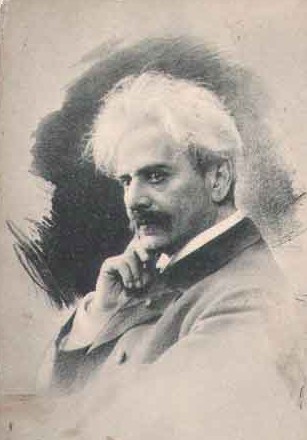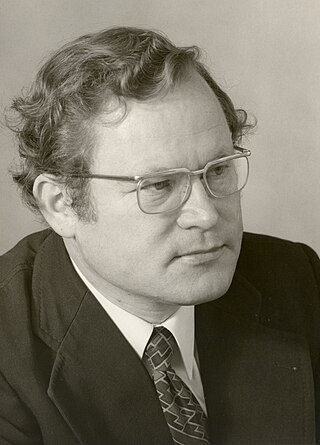
David Popper was a Bohemian cellist and composer.

Hugo Becker was a prominent German cellist, cello teacher, and composer. He studied at a young age with Alfredo Piatti, and later Friedrich Grützmacher in Dresden.

Graham Waterhouse is an English composer and cellist who specializes in chamber music. He has composed a cello concerto, Three Pieces for Solo Cello and Variations for Cello Solo for his own instrument, and string quartets and compositions that juxtapose a quartet with a solo instrument, including Piccolo Quintet, Bassoon Quintet and the piano quintet Rhapsodie Macabre. He has set poetry for speaking voice and cello, such as Der Handschuh, and has written song cycles. His compositions reflect the individual capacity and character of players and instruments, from the piccolo to the contrabassoon.
Siegfried Palm was a German cellist who is known worldwide for his interpretations of contemporary music. Many 20th-century composers like Kagel, Ligeti, Xenakis, Penderecki and Zimmermann wrote music for him. He was also Rektor of the Hochschule für Musik Köln and Intendant of the Deutsche Oper Berlin.

Gestural Variations, Op. 43, is a trio composition by Graham Waterhouse in 1997 originally for oboe, bassoon and piano. Later versions are scored for clarinet, cello and piano (1999) and flute, cello and piano (2009).

Celtic Voices and Hale Bopp, op. 36, are two independent compositions by Graham Waterhouse for string orchestra, which were published together in 1998 by Hofmeister, Leipzig. Celtic Voices was written in 1995, Hale Bopp was written in 1997 inspired by Comet Hale-Bopp, and scored for an additional boy soprano.

Piccolo Quintet is short for the Quintet op. 26 of Graham Waterhouse, composed in 1989 for piccolo and string quartet and published by Zimmermann in 2002 as Quintet for piccolo, 2 violins, viola and violoncello.

The Bassoon Quintet is a quintet by Graham Waterhouse, composed in 2003 for bassoon and string quartet.

Herbert Blendinger was an Austrian composer and viola player of German origin.

Bei Nacht, op. 50, is a piano trio, composed in 1999 by Graham Waterhouse, published by Hofmeister, Leipzig.
Friedrich Hofmeister Musikverlag is a publisher of classical music, founded by Friedrich Hofmeister in Leipzig in 1807. Early listings included composers Ludwig van Beethoven, Frédéric Chopin and Franz Liszt. Hofmeister was the first to publish Mahler's Second Symphony. Pedagogical works, such as a Violinenschule of Hubert Ries (1841), are still in use. The company sells sheet music internationally, including Asia and America.

Der Handschuh is a composition by Graham Waterhouse. He wrote the setting of Friedrich Schiller's ballad for cello and speaking voice in 2005. It was published in 2007 in Heinrichshofen's Verlag.

Rhapsodie Macabre is a composition for piano and string quartet in one movement by Graham Waterhouse, written in 2011 as a homage to Franz Liszt. It was first performed at a Liszt festival of the Gasteig, Munich, with the composer playing the cello part.

Graham Waterhouse, cellist and composer especially of chamber music, has written a number of works for string quartet, three major works in several movements, several smaller works and compositions for a solo instrument and string quartet.

The Cello Concerto, Op. 27, is a concerto for cello and orchestra by Graham Waterhouse, composed in 1990. It was first performed in 1995 in Toluca and Mexico City with the composer as the soloist, and published by Friedrich Hofmeister Musikverlag in Leipzig in 2000.

Graham Waterhouse, cellist and composer especially of chamber music, has written a number of song cycles. As a cellist, he has used string instruments or a Pierrot ensemble instead of the typical piano to accompany a singer. In 2003 he composed a first cycle of songs based on late poems by Friedrich Hölderlin. In 2016, he set nursery rhymes, excerpts from James Joyce, and texts by Shakespeare. In 2017, he wrote settings of poems by Irish female writers, and in 2022 a cycle of Buddhist texts for mezzo-soprano, cello and piano.

Praeludium (Prelude), Op. 32, is a piece for piano by Graham Waterhouse, composed in 1992 and published by Lienau in 2002. The virtuoso composition has been played in concert internationally, and was recorded.

Variations for Cello Solo is a composition written by Graham Waterhouse in 2019. The variations depict characters of personalities. The cellist and composer performed the world premiere in Vienna in 2020. The composition was published by Schott the same year.
Four Epigraphs after Escher, Op. 35, is a chamber music composition by Graham Waterhouse, written in 1993 for viola, heckelphone and piano. Its four movements refer to graphic artworks by M. C. Escher. It was premiered in Munich in 1995, and the U.S. premiere was given in 1998. It was published by Hofmeister in 1998.





